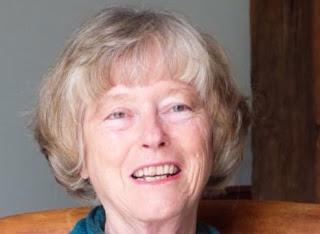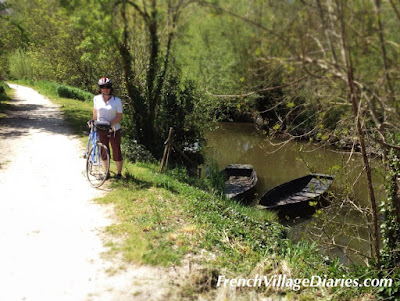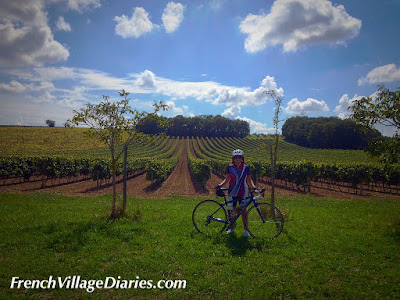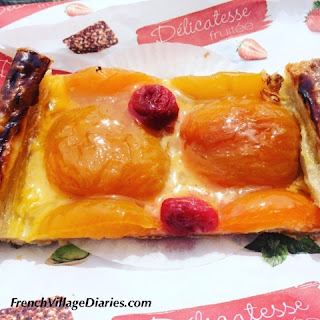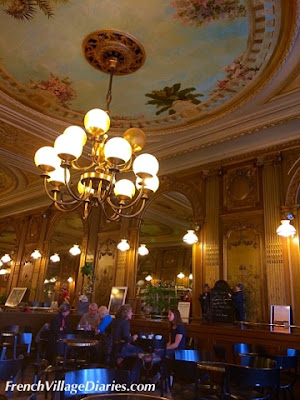Welcome to ‘France et Moi’ where this week I am talking to author Marie
Laval about what France means to her.
 |
| Marie Laval |
Originally
from a small village near Lyon in France, Marie has lived in the beautiful
Rossendale Valley, Lancashire, England, for the past few years. She works
full-time as a modern languages teacher and when she isn't busy looking after
her family and preparing lessons, she loves dreaming up romantic stories. Her
contemporary romantic suspense A Spell in Provence (see my review here), as well as her historical
novels Angel Heart
(see my review here), as well as her historical
novels Angel Heart (review coming soon), the award-winning The Lion's Embrace
(review coming soon), the award-winning The Lion's Embrace and her Scottish
trilogy DANCING FOR THE DEVIL are all published by Áccent Press.
and her Scottish
trilogy DANCING FOR THE DEVIL are all published by Áccent Press.
Firstly, I think France is a special place and it is famed for many
things including its cheese, wine and diverse holiday locations plus, dare I
say it strikes and dog poo littered streets. What do you think makes France so
very unique and ‘French’?
Marie: For me it has to be the
long, leisurely lunches with friends and family, the heated discussions about
politics or just about anything (!), the incredible variety of landscapes...and
the scents, but that's probably because scents always take me back to my
childhood. There is nothing as evocative to me as smells of warm bread drifting
out of the bakeries, of coffee and beer in cafés, or ripe fruit and fresh vegetables
in the outdoor market.
2) As a French woman living in the UK I have to ask you about French
women, what do you think makes you different to us and gives you that je ne sais quoi?
Marie: If you knew me,
Jacqui, you wouldn't ask that question! I don't think I have anything special
that makes me different from English women - apart perhaps from my love of navy
blue, red and white clothes, and my terrible French accent, which seems to be
getting worse the older I get!
3) How does France inspire your writing?
Marie: I find inspiration
in so many things, from memories of childhood holidays, to songs or novels, or
again stories my mother used to tell me about growing up in Algeria... My
family used to spend summer holidays in Provence, either in a tiny rental house
in a pine wood near Hyères, or at my uncle's ramshackle house in Avignon. Memories
of those sunny holidays inspired the setting of my romantic suspense A SPELL IN
PROVENCE. My love for Lyon and its history inspired much of my debut historical
romance ANGEL HEART, as did the fantastic story that Napoleon had stopped in my
village on his way to Paris after he came back from his exile in Elba!
4) Lyon is somewhere I would love to visit one day, what are your top
tips for a quick visit?
 |
| Lyon |
Marie: Lyon is a wonderful
city, and one that was declared World Heritage Site by Unesco a few years ago.
I would start by a stroll down the two main pedestrian streets - Rue Victor
Hugo and Rue de la République, with a walk around Place Bellecour, the largest
pedestrian square in Europe. From there I would walk across the bridge over the
river Saône and into the St George and St Jean districts, so atmospheric with
their cobblestone streets and Renaissance buildings. I would take the
'funiculaire' right up to Fourvière and admire the panoramic view over the city.
After visiting the basilica, I would walk back downhill towards St Jean,
taking the time to look at secondhand book and gift shops. I would, of course,
stop at a café for a drink and a crêpe, or if it was lunchtime, I would sample
a 'quenelle' or some 'charcuterie' in a 'bouchon' (a small restaurant serving typical
Lyonnaise cuisine). I would also go into a few 'traboules', which are
passages silk weavers used to take to keep the rolls of fabric from inclement
weather.
I would then cross over the river into the 'Presqu'île' and the Place des
Terreaux, before going up another hill - La Croix-Rousse, the old silk weavers
district.
One thing Lyon is famous for as well as its gastronomy, is its incredible
wall art. Look at the buildings and you will be amazed.
There is another, more leisurely way of seeing the town. You can take a
river cruise down the Saône all the way to Ile Barbe, a lovely island North of
Lyon.
5) France has many different cheeses, a silly question, but which French
cheese are you? A hard and mature Tome, a soft, fresh and lively goat cheese,
the creamy and rich Camembert or maybe the salty and serious Roquefort?
Marie: Do I really have to
choose? I am a cheese addict.
6) Imagine you are sitting outside a French café at 10.00am on a sunny
morning watching the world go by, what do you order from the waiter?
Marie: An expresso and a
pain au chocolat, followed by a 'diabolo citron' (lemonade and lemon cordial).
7) Every region in France has it’s own culinary speciality, do you have a
favourite regional dish?
Marie: That's a tough
question, Jacqui, but I will choose a speciality from Lyon - and not frogs
legs, although they are a must if you stop at one of the outdoor restaurants
along the Saône. One of my favourite dishes ever are 'quenelles de brochet' in
Nantua sauce - a dish made with pike, butter, milk and eggs, in a crayfish sauce. Simply
delicious.
8) Do you think the French have a different attitude to food than the
British and if so, is it a healthier one?
Marie: Things have changed
a lot in England since I first arrived. People now enjoy preparing food from scratch,
trying 'foreign' recipes and taking their time over a meal. In France people
take mealtimes very seriously, with three courses and freshly prepared food,
although I suppose that, like everywhere else nowadays, more and more people are
turning to frozen and convenience foods.
9) Best French tipple, and yes I know there are many to choose from?
Marie: It would have to be
either Pomerol or Chateauneuf
du Pape...and champagne, of course.
Finally, do you have any current projects you would like to tell my readers
about?
Marie: I am shortly to
release a historical short story set in the Camargue - SONS OF THE WIND - as
part of an anthology of short stories called LETTERBOX LOVE STORIES which
features American, Canadian and European romance authors.
I am also editing a contemporary romance set in Scotland, PINK FOR HEART,
and researching for another romantic suspense set in Paris. As usual, there
aren't any hours in the day!
Thank you for taking the time to answer some questions about France and
you and I'm really looking forward to reading Sons of the Wind and the romantic suspense set in Paris.
Marie: Thank you very much, Jacqui,
for inviting me to your blog.








